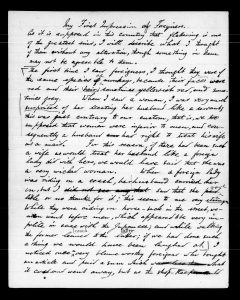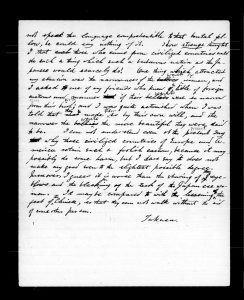Takasu


My First Impression of Foreigners
(Transcribed by Priya Agarwal and Shanon Hiner)
As it is supposed in this country that flattering is one of the greatest sins, I will describe what I thought of them without any alteration, though something in them may not be agreeable to them.
The first time I saw foreigners, I thought they were of the same species as monkeys, because their faces were red and their hair, sometimes yellowish-red, and sometimes grey. When I saw a woman, I was very much surprised of her treating her husband like a servant; this was just contrary to our custom, that is, we supposed that women were inferior to men, and consequently a husband had right to treat his wife as a maid. For this reason, if there had been such a wife as would treat her husband like a foreign lady did with hers, we would have said that she was a very wicked woman. When a foreign lady was riding on a coach, her husband carried her on, but I saw that she gave little or no thanks for it; this seems to me very strange. While they were riding on horse-back in the street, women went before men, which appeared to be very impolite in case with the Japanese; and while walking the former leaned to the latter; if we had done such a thing we would have been laughed at.
I noticed once a very blame worthy foreigner who bought an article and paid a sum which was less than what it cost and went away, but as the shop-keeper could not speak the language comprehensible to that brutal fellow, he could say nothing of it. How strange thought I that those who came from civilized countries could do such a thing which such a barbarous nation as the Japanese would scarcely do! One thing which attracted my attention was the narrowness of the waists of women, and I asked one of my friends who knew a little of foreign customs and manner if their waists were so narrow from their birth; and I was quite astonished when I was told that they made them so by their own will, and the narrower the waists the more beautiful they were said to be. I can not understand even of the present day why these civilized countries of Europe and America retain such a foolish custom, because it may possibly do some harm, but I dare say it does not make any good even to the slightest possible degree. Moreover, I guess it is worse than the shaving of the eyebrows and the blackening of the teeth of the Japanese women. It may be compared to with lessening of the feet of the Chinese, so that they can not walk without the aid of some other person.
Takasu.
-
TAKASU ROKURO 高須碌郎
One of the first nine students of the School of Chemistry of Kaisei Gakko. He became the first graduate of the Chemistry Department, Faculty of Science, University of Tokyo, in 1877. He served the Ministry of Education.Also read his “A Sketch of My Life.” -
The essay written by Takasu has many interesting elements when considering the essay from the perspective of a student observing foreigners. Takasu opens the essay by describing the appearance of foreigners. Their features are of particular interest as the coloration of the hair and faces of the foreigners seem to Takasu as if the people he observed were monkeys. This is probably due to the fact that the lighter coloration of the hair was something new that Takasu has not observed before so the people seemed to be of a different species.
The next thing that Takasu mentions, is the behavior of the women. The strange behavior that was observed of the women was very intriguing and questionable to Takasu. It was very different to see women treat the man as their servant rather than the other way around. Takasu found it very surprising that the woman seemed to be superior when seeing actions such as riding on horseback or walking. Takasu notes that if this were to happen in Japan, the man would be laughed at and a woman would be seen as “wicked.” These observations must also be very surprising to Takasu to see a different relationship between a woman and a man compared to what is known to be the typical relationship in Japan. Comparatively, in the Western countries, women were seen to have more freedom and would be more involved with their husbands while in Japan women were known to be seen as maids and inferior and very often would be expected to stay in the home while the men were away. Comparatively, it was most likely shocking for Takasu to see this.
Another thing that Takasu found of interest was the appearance of the waists of women. It is noted that this action seems unnecessary and it is hard to understand since the process could cause potential harm. Takasu was shocked to find that this act of beauty was done by the women’s own will. The idea is compared with Japanese women’s beauty customs and Chinese foot binding. It is interesting because Takasu is unable to understand the customs that are for beauty and finds that the thinning of the waists seems to be worse than the Japanese customs and comparable to the foot binding.
One last thing that Takasu observed was a foreigner obtaining an item for a cheaper cost because the seller was unable to speak the foreign language. What was discerned from seeing this interaction, was that Takasu found it to be unbelievable that an apparently “civilized” person could do something so vile while the supposedly “barbarous” Japanese would not even consider committing that action. Overall, it seems that Takasu has many realizations that the foreigner may not appear to be what they were thought of to be in terms of being “civilized.” It is also hard to understand many of their customs and relations because they are so different and hard to compare with what is familiar to the Japanese.
-
Reading Takasu’s essay about “My Impressions of Foreigners” was extremely enlightening as well as amusing. My first thought was that even though this essay was written more than a hundred years ago, the writing was still, for the most part, clear and legible. It’s fascinating that we can read something from the perspective of a student so long ago and be able to clearly understand it. One of the first things he says is, “The first time I saw foreigners, I thought they were of the same species as monkey.” This was amusing to me because it’s fascinating to think that these students had never seen a white person before. So to them, this was something completely new. Oftentimes, white Americans have used the word “monkey” as a derogatory term against other races and so it is interesting to see that it was used against them as well. The rest of the essay focuses heavily on Western women. The student seemed to think that it was very rude of such women to treat their husbands “as a servant”. To us in the modern-day, this seems strange to read because even Western women at the time lacked fundamental rights. But, to the Japanese student at the time, it must have been very different than the custom he was used to. The women he had previously seen were not treated and did not act in this way, and so to him, it seemed quite outrageous. Furthermore, Takasu thought it was strange that these women’s waists were so tiny. He didn’t understand the Western beauty fascination of having a tiny waist. He does concede though that there are some trends seen in all types of countries such as the blackening of teeth of Japanese women and the foot-binding of Chinese women. All in all, Takasu seems to not understand Western culture. This makes sense because it was all totally new to him. I imagine that Americans held similar views about Japanese culture because of how new it was to them. Therefore, this was a very interesting piece to read.